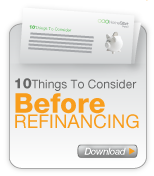Answers To Common Home Refinance Questions In Houston
Frequently Asked Questions Related to Refinancing
Why should refinance my mortgage?
There are several good reasons to refinance your mortgage but typically it comes down to making your monthly payment more affordable. To do this you need to do one of the following either reduce your interest rate or extend your amortization (extend the life of the loan). Of course, if you can do both the overall reduction in monthly payment will be greater. Other reasons for refinancing include divorce (removing spouse from house note), removing escrows, switching from an adjustable rate mortgage into a fixed rate mortgage, or refinancing a private loan with a conventional loan from a lending institution allowing you to build credit.
Do I have to pay closing costs if I refinance my mortgage?
Closing costs are inevitable. So beware of advertisements that say there are no closing costs involved in the closing a home loan. However, when you refinance you can either elect to roll in the closing costs, pay for them out of pocket, or HomeStart can pay for the closing costs. Most chose to roll-in the closing costs of their home into the new note. Although this increases the size of the old note, the cost savings of the new note due a lower interest rate or the extension of the due date will outweigh the addition of the closing costs. Ask about how HomeStart can pay for your closing costs.
I heard a lender say that they would refinance my loan without any closing costs, is this true?
No. Closing costs are inevitable. What they plan on doing is one of the following. One they plan on rolling in the closing costs into you new loan. This will avoid you having to pay “out-of-pocket” closing costs. Some call this a “no closing cost” scenario. Or second they plan on paying for the closing costs themselves. Under the second scenario, the interest rate they will offer will be much greater than a standard closing costs scenario. Either way closing costs were charged and not avoided. It’s important to ask your HomeStart loan officer about the different ways closing costs can be addressed and which scenario will best suit your needs.
Why is my new note larger than the principal balance the last mortgage invoice?
There are several reasons why your refinanced loan has a slightly larger balance than your old note. When you refinance a note typically closing costs are rolled into the new note and this will explain the majority of the increase. However, outside of closing costs the following issues will increase the size of the new note; odd days interest (accrued interest on the old note), negative escrows, prepayment penalties, forbearance payments, payoff charges, release of lien fees (others may apply). When starting a refinance application be sure to ask your HomeStart loan officer what charges on your old loan will affect your new loan balance. Ask to see your official payoff.
Can HomeStart roll-in my closing costs into my mortgage on a refinance? Should I roll them in?
Yes HomeStart can roll in your closing costs into your loan. But the amount that can be rolled into your loan will be dependant on your qualification and maximum allowed loan-to-value (LTV). Rolling in your closing costs is typically a wise decision because doing so does not deplete your savings nor does it affect your monthly payment very much. Paying for closing costs up front or having the lender pay for the closing costs can have longer lasting affects. Consult with your HomStart loan officer to see which solution best suits you.
I have been told I can avoid a payment for two months, is this true?
YES and NO. Remember the old saying "The is no such thing as a free lunch?" The reson this is sometimes true is because at closing you will pay advance interest or "Interim Interest? pre-paying your loan to the end of the current month. You will then not pay until the end of the next month to pay for the accumulated months interest. Example: Your loan closes January 6th. At closing you pre-pay the interest to January 31st, and on March 1st you pay your first payment covering the interest accrued for the month of February. So, in essence you didn't make a mortgage "payment" for 2 months but it was paid for in some form.
Do I have to pay my taxes early if I refinance late in the year?
YES. When you decide to refinance your home late in the year it may be the case that the lender requires you satisfy the property’s tax bill even if you are electing to not escrow. The requirement to pay your taxes will depend on whether the taxing authorities have invoiced the property for that year’s taxes. Taxing authorities typically declare year-end taxes by mid-November and are considered due sometime in late January of the proceeding year. Even though taxes may not be technically due until mid or late January there is a good reason for this practice. The main reason lenders require the “prepayment” of year-end taxes is because title companies will not insure the lender’s position if all title issues are not cleared before or at time of closing. In some cases, this requirement may be waived. If you were unprepared to pay your taxes or did not have an escrow account setup you may be able to roll-in the taxes into your new loan. If you are deciding to refinance towards the end of the year make sure to consult this issue with you HomeStart loan officer!
Should I continue to escrow or remove my escrows when I refinance?
There is no right or wrong answer and this largely depends on your long-term goals and financial flexibility. Most people decide to remove escrow (see “what are escrows”) when refinancing because they want the flexibility of managing their cashflow, they want to reduce their overall monthly housing cost and would like to have the reserves deposited with the current lender returned to them. But remember, if you decide to remove escrows do not forget to plan ahead for the year-end taxes that will have to be paid off in one lump sum at the end of the year. If you decide to escrow a new escrow account will need to be setup with the required reserves. The old escrow account with your previous lender cannot be transferred. It will instead be returned to you after the old loan is paid off (see next question). Ask your HomeStart loan officer for more information and help in deciding what to do.
What happens to my escrow balance with my previous lender when I refinance? Do I get that back?
When you refinance your old loan whether you decide to setup escrows on the new loan or not your old escrow account with your previous lender will be returned directly to you. Your loan servicer is obligated to return the full amount of your escrow account to you within 45days of satisfying the previous lien. You can typically request the funds via wire transfer or paper check. Unfortunately you cannot transfer an escrow balance with one lender to another lender. Ask your HomeStart loan officer for more details.
Why is my payoff higher than my previous balance on my last invoice?
There are several reasons why your payoff could be higher than your last invoice. Those items that would have the largest affects would be items such as 1) pre-payment penalties; 2) negative escrow balances; or 3) forbearance payments. However, these items are not very common. Common items that increase your loan payoff are items such as 1) odd days interest (accrued interest since your last payment); 2) payoff request fees; 3) release of lien fees; and 4) recording fees. Ask you HomeStart loan officer to look into your payoff before getting too far into your refinance.
I was told I have a negative escrow balance. What is that? How did that happen?
A negative escrow balance is a situation in which your escrow account dips below zero. In most cases, your servicer will require you to replenish your escrow balance back up to a normalized level. This could amount to thousands of dollars. Some loan servicers may only give you 45days before charging late fees on past due escrow payments. In some cases, the late fees may equal your monthly required escrow payment. There are two main reasons why your escrow balance may turn negative. The most common is a situation in which you escrow account was originally under funded to begin with and was not setup to correctly account for future taxes and insurance premiums. This happens most often when a buyer purchases a new home from a builder and the builder’s preferred lender under estimates escrow balances based on artificially low taxes that were based on unimproved values (no house) knowing full well that future taxes will be based on improved value (with a house). This practice is legal but misleading and is only done to entice new home buyers under the guise of better, cheaper financing. The other main reason for this occurring is that taxes and insurance (the two main components of escrows) tend to increase each year and many times your loan servicer does not correctly account or had no way knowing the increase in advance resulting in a negative balance at the end of the year.
If I have a negative escrow balance can that be rolled into my new mortgage?
YES. Negative escrow balances can be rolled in but it will depend on your available equity and how high of a loan-to-value you will qualify. If there is enough equity in your home you can use that amount to satisfy the negative escrows balance. If you have a negative escrow balance alert your HomeStart loan officer and ask them to see if your equity can be used to satisfy this balance.
Will refinancing improve my credit?
Not necessarily. However, it could help because you are closing out an old account and opening up a new account with a still unproven track record. If after you refinance you pay your mortgage in a timely manner this should help to increase your credit scores more so than had you held onto your previous mortgage. This of course is not the main reason to refinance your current mortgage but rather to obtain a lower a monthly payment or more favorable financing terms.
I want to refinance my loan but the loan officer says the max he can lend is 80%. Why is that?
In the state of Texas once you have completed a cash-out or home equity loan on your homestead or primary residence the maximum loan-to-value (LTV) allowed thereafter is 80%. This restrictive ruling is actually part of the Texas Constitution (see section 50 (a) (6) article XVI). County records identify the fact that the home had previously had home equity lien filed against it. This will be the case until the home is sold or conveyed to a different party removing this restriction. Until then, the maximum allowable loan-to-value is 80%. So if you are in the process of refinancing your current loan please remind your HomeStart Loan officer if you had previously performed a cash-out or home-equity loan against your home.










